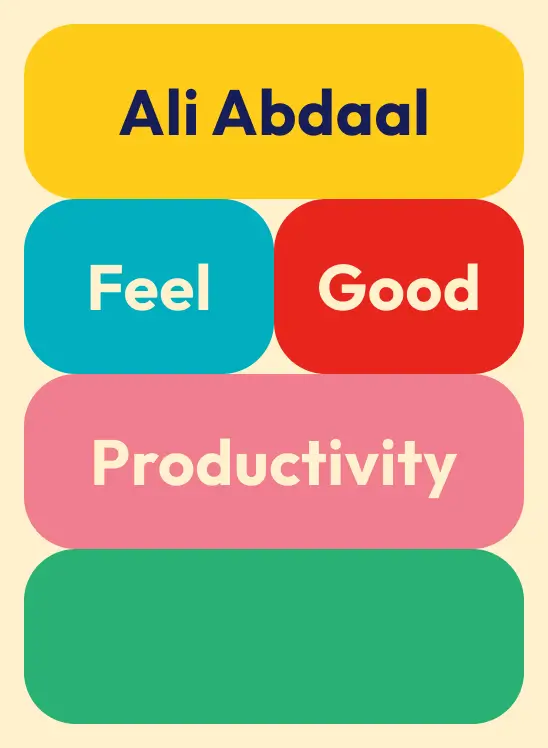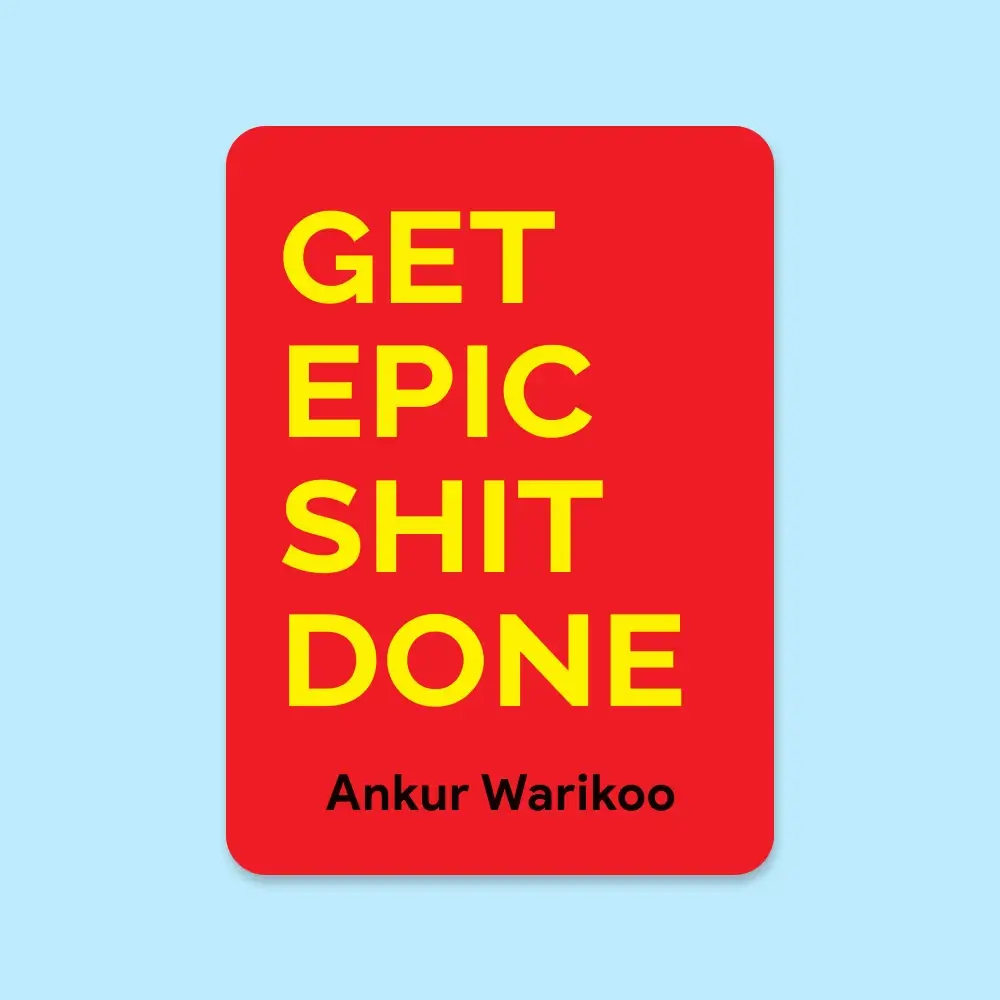
The Unfair Advantage
🎯 Success ≠ hard work alone - It’s not just about grinding. It’s about leveraging your unique unfair advantages—those assets others can’t easily replicate.
🔑 What is an Unfair Advantage? - A condition, asset, or trait that gives you a competitive edge. It’s often circumstantial, personal, and hard to copy.
🔁 They multiply, not just add - Unfair advantages compound. Stack them early and intentionally to accelerate success.
🧠 Use the MILES Framework - Money, Intelligence & Insight, Location & Luck, Education & Expertise, and Status—identify and strengthen your personal mix.
🪞 Mindset shifts everything - Gratitude and perspective transform how you see opportunities. Adopt a reality-growth mindset to see your hidden advantages.
🧍 Circumstances matter - Not everyone starts equal. Own your context and shape your path instead of chasing cookie-cutter success formulas.
🤝 Partner up smartly - Complement your gaps with cofounders who bring different unfair advantages to the table.
💼 Ideas are cheap—execution wins - Don’t romanticize ideas. Great execution, team, timing, and clarity are what move the needle.
📣 Pitch with clarity, not fluff - Avoid jargon. Speak plainly and concisely. Investors value clear, specific, no-BS communication.
💌 Networking = adding value - Be genuine. Listen first. Share insights. A strong, helpful network is a massive multiplier.
🚀 Growth mindset = startup fuel - Test, adapt, iterate. Be loyal to outcomes, not to tactics. True growth hackers detach from ego and embrace change.
📈 Real success isn’t flashy - Don’t confuse flashy lifestyles with real achievement. Fulfillment > filters. Focus on impact, joy, and relationships.
-
Success in the startup world is not simply awarded to the hardest workers. It is awarded to those who develop and use their Unfair Advantages.
-
An unfair advantage is a competitive upper hand, and your set of unfair advantages is unique to you. It’s more than just a unique selling point, it’s a fundamental leg-up over the competition, and sometimes it’s not one that is ‘earned’ or worked for.
-
‘It’s not about working harder. It’s about working the system.’
-
This oversimplification of hard work = success is not only misleading, it can be downright confusing when you don’t know what to work hard on.
-
Life is too random and arbitrary to balance out and give everyone an equal share. We don’t all have the same opportunities. We don’t all get what’s coming to us. That’s why we have to make sure we are compassionate to others and ourselves if life doesn’t always turn out quite as well as we’d hoped.
-
An Unfair Advantage is a condition, asset or circumstance that puts you in a favourable business position.
-
Your Unfair Advantages can’t easily be copied or bought. Your set of Unfair Advantages is unique to you.
-
Always partner up with somebody with unfair advantages that balance out yours.
-
Unfair advantages (just like disadvantages) build one on top of another and have a snowballing effect. They don’t just add together, they often multiply together. In other words, the more unfair advantages you can stack up in life, and the earlier in life you can develop them, the stronger they will be.
-
You can work to develop unfair advantages for yourself, based on what you have to start with – you can get an education, develop expertise, move cities or even countries, make friends, expand your networks and, most importantly, change your mindset. These are unfair advantages that you can develop proactively.
-
Unfair Advantages are not just about your strengths, which is what you’ll often read about in business and self-help books. The unique thing about the Unfair Advantage concept is that it also takes into account your circumstances.
-
MILES Framework. They are: Money Intelligence and Insight Location and Luck Education and Expertise Status
-
You can change your mindset in an instant, simply by looking at your circumstances and your life situation through a different lens.
-
Focusing on what you’re grateful for in life can make you feel happier, less stressed and more focused, all without having to change your external circumstances at all. This then allows you to work better and feel better about the work you’ve done. All of which shows how your mindset can affect both the quality and outcomes of your life.
-
Reality-growth mindset is the fertile soil from which your unfair advantages spring. Treat it properly and you will see a wealth of opportunity pop up all around you. Even though nothing will have changed about your situation, this mindset will show you a whole new world.
-
People will follow a leader with vision, even if that vision turns out, in the end, to be a poor one. The person with vision serves as a prophet, voicing the unknown and bringing it into reality. If you are not able to imagine the future with your organisation, there is really little reason to continue moving forward. One setback, and you’re done.
‘An entrepreneur is someone who will jump off a cliff and assemble an airplane on the way down.’ — Reid Hoffman
-
The main thing to consider if you don’t have the unfair advantage of Money is to build a business that doesn’t have a high startup cost, and doesn’t need to burn much money before it becomes profitable.
-
Business success is almost always about relationships and adding value to other people, and assembling and working in a team.
‘The two most important requirements for major success are: first, being in the right place at the right time, and second, doing something about it.’ Ray Kroc, pioneer of McDonald’s
‘There is no wealth like knowledge, no poverty like ignorance.’ Ali Ibn Abi Talib
- Education doesn’t stop when you get out of school. In fact, it doesn’t start when you get into school. Life is learning, from the moment you arrive.
‘The world more often rewards outward signs of merit than merit itself.’ La Rochefoucauld
-
The way to increase your connections ‒ your network ‒ is through adding value, finding commonalities and being social.
-
Your Inner Status is an extremely powerful way to increase your Outer Status. It is your self-esteem.
-
If you like and value yourself, you will have high self-esteem. You’ll come across as confident, competent, likeable, trustworthy and engaging.
-
In the social media era we now live in, you only see the rosy side of the story. People hide their failures and hide the difficulty of being their own boss.
-
Beware of confusing society’s symbols of success (fast cars, private jets, designer clothes, fancy restaurants, exotic holidays) and actual success (happiness, fulfilment, self-actualisation, growth, learning, adding value to others, having positive impact, having the freedom to spend quality time with the people you love).
-
First of all, ideas are overrated. Yes they’re important, but there are countless people all over the world having the same genius ideas at the same time, and the overall conversion rate from idea to successful startup is close to zero.
-
Second, it’s a myth that they need to be completely unique and new to be successful.
-
Networking shouldn’t be a ‘salesy’handing out of business cards. Make it a genuine desire to learn about people and listen. If you listen closely, you may be able to get great insights that help uncover business needs and reveal other perspectives.
-
The strength of your network increases the more you add value to it.
-
This is very dangerous. Beware of falling in love with your idea before you have any feedback from prospective customers/users.
-
The true growth hacker has a growth mindset. They are not attached to any particular marketing or distribution channel. They are not in love with what worked in the past. They are looking at the world as it is, assessing options, testing often, and then making a move on what works best.
-
If your communication is not crystal clear, then you’re going to have an incredibly uphill battle. We see this problem a lot from the hundreds of pitches we’ve listened to ourselves. Please work on making your initial messages, emails and pitch ultra-concise and to the point. Avoid jargon. Speak in simple language. Don’t use marketing speak, as you would with advertising to consumers – that doesn’t work on investors and just irritates them. Brevity is key.
-
To achieve clarity in your communication, you need to be specific. Specificity is ultra-important. Don’t say things like ‘We’re revolutionising social media’, say exactly what your startup will do –‘We are getting rid of the newsfeed’, for example.
-
Try to find investors who really believe in you, rather than those who simply invest based on FOMO.
-
A quick way to learn if somebody is interested in your startup is to ask a simple question such as ‘Can I send you my deck for feedback on slide 7 please?’, and then email over a short deck.



